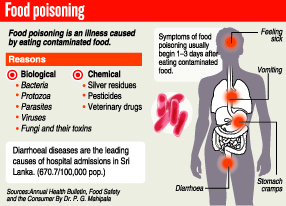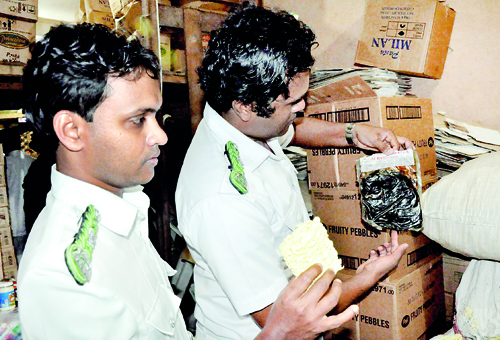News
Toxin and cancer risks from spoiled food, experts warn
Sprats, the common man’s protein, makes a mockery of nutrition needs when sold putrified and contaminated and could trigger illnesses varying from food poisoning to cancer, warned a senior microbiologist who pointed to possible links between outbreaks of food poisoning and unscrupulous marketing of contaminated food.
Recent raids have uncovered not only spoiled food set for release onto the market but also chilli and spice powders adulterated with dyed flour.
“Certain fungi can cause toxin production that leads to food poisoning. When food items go beyond their expiry dates other organisms can consume the nutrients,” said Dr. Sujatha Pathirage, a consultant microbiologist attached to the Medical Research Institute.
Dr Pathirage said the finding of 57 tonnes of outdated, contaminated sprats from warehouses in Wattala and Dankotuwa was a cause for concern.
Consumer Affairs Authority (CAA) spokesman Asela Bandara said a raided Dankotuwa warehouse holding 10 tonnes of dried sprats contaminated with fungi and worms had not only been used as a store but also a place to secretly clean and repack spoiled sprats for sale.
Another 47 tonnes of spoiled sprats recovered from a warehouse in Hendala, Wattala had been repacked for sale and would have fetched Rs. 30 million.

Recent raids conducted by PHIs in and around Colombo have unearthed outdated food stuff on a regular basis
Most of the spoilt and contaminated sprats are mixed along with quality ones to be sold to unsuspecting customers.
In raids over the past few weeks, health, police and consumer affairs officials have found chilli powder and chilli sauce coloured with fabric dye, stocks of outdated canned fish, rice, sugar, frozen chicken and pork, refuse tea leaves and rotten potatoes and onions.
Dr. Pathirage said there had been three recent outbreaks of food poisoning and the consumption of such products could cause more outbreaks.
The use of fabric dye in food items has triggered health concerns among medical officials, Dr. Pathirage said.
On Wednesday, CAA officials found 50kg of boondhi sweets made using red fabric dye – and past their expiry date – at a warehouse in Kandana.
Several weeks ago, the CAA found large stocks of adulterated chilli and turmeric powder made using wheatflour or watana flour, textile dye and synthetic aroma.
“These products are not only going to small retail shops in Colombo and country areas but are also sold in bulk to food boutiques and small Chinese restaurants at low prices,” Mr. Bandara said.
The Sunday Times learns that about 10 grams of fabric dye is used to colour 20kg of flour that is mixed with authentic spices. Big profits are made by rogue dealers because a kilo of wheatflour costs less than Rs.100 while genuine turmeric costs about Rs. 600 a packet and chilli powder Rs. 300-400 a packet.
Drinking a cup of of plain tea from a kade is a common sight – but recent raids show even a cup of tea is not safe.
Police Special Task Force officers last week arrested six people involved in dumping refuse tea leaves on the market. The suspects were arrested with 20,000kg of tea in Polgahawela. In a separate raid the CAA confiscated 100,000 tons of outdated sugar from a storehouse in Mutwal.
| Food additives like MSG to be banned
The Health Ministry, in consultation with the Food Advisory Committee, has decided to restrict artificial flavouring agents and emulsifiers such as monosodium glutamate (MSG) used in food. Artificial emulsifiers will be prohibited in milk and dairy products, ice-cream and frozen desserts, fat and oil, margarine and fat spread, fresh fruit and vegetables, mushrooms and mushroom-related products, vine made of fruit, vegetable and fruit mix, chutneys, rice and pulses, powdered pulses, sago, pasta and noodles, malt included food and drink, bakery items, fresh meat, chicken and fresh fish, crustaceans, white and brown sugar, sucrose, fructose, glucose, sugar syrup, jaggery, treacle, sugary spreads, bee honey, sweetmeats, ice-candy and preparation mixtures. The items to be banned from 1 July are Aloin, Berberine, Beta-Azarone and Cinnamyl Anthracillate, Cade Oil, Calamus Oil, Cocaine, Coumarin, Diethylene Glycol, Diethylene Glycol Mono Ethyl Ether, Estragol, Eugenyl Methyl Ether, Hypericine, Nitrobenzene, Pyroigenous Acid, Saffrole and Isosaffrole, Sontonin, Sasafras oil, Thujone, Isothujone, tonka bean. Emulsifiers such as monosodium glutamate (MSG), Disodium guanylate, Disodium 5’-inosinate will also be banned. A special order has been issued by the Ministry has stated that if importing such flavouring or emulsifiers, a safety certificate from the country of manufacture or origin should be produced. If not, importing, storing, transporting, advertising, selling and use is prohibited, and violaters of the law will be prosecuted under the Food Act. |

